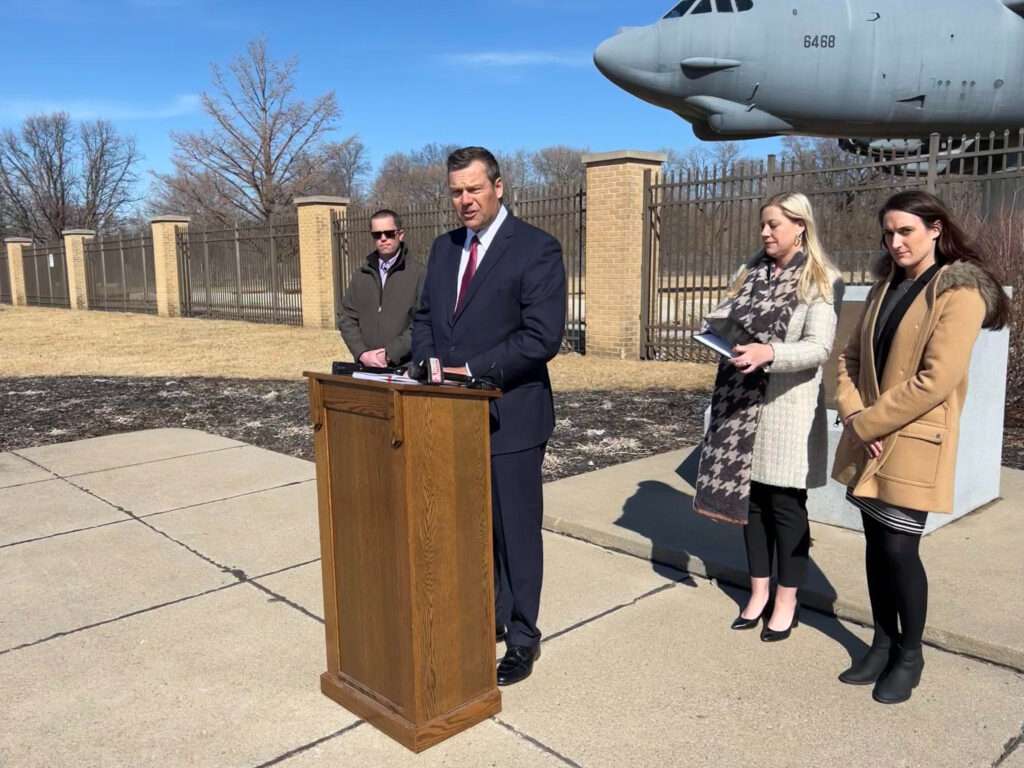By ARRON SANDERFORD
Nebraska Examiner

BELLEVUE — Kansas lawyer Kris Kobach came to Nebraska’s Offutt Air Force Base on Tuesday to announce that he was filing a federal lawsuit for 36 Air Force, Air Force Reserve and Air National Guard members he said have been denied religious exemptions to the military-mandated COVID-19 vaccine.
Kobach, representing the Alliance for Free Citizens, and lawyers Jessica Hart Steinmann and Rachel Jag of the America First Policy Institute said they chose to file in Nebraska because “about half” of the Air Force members who joined the lawsuit are based at Offutt.
The Nebraska case is part of a national effort to fast-track one of several anti-mandate lawsuits to a more conservative U.S. Supreme Court, which might prove receptive to carving out religious-based legal exceptions to vaccine mandates.
The core of the lawsuit’s legal argument is federal encroachment on the free exercise of religion guaranteed by the First Amendment. The lawsuit also leans on a law Congress passed in 1993, the Religious Freedom Restoration Act.
Lawyers for the federal government have argued elsewhere that the military requires service members to be given multiple vaccines to prevent the spread of various diseases, in order to keep military units in fighting shape and to maintain order.
“The facts presented in the suit make clear just how transparent and wrong the military justification is for taking away the religious freedom of these airmen,” Kobach said.
Two Nebraska Air National Guard members spoke Tuesday about why they joined the lawsuit during a news conference held just outside the Offutt Gate. Maj. Matt Downing, a pilot, and Maj. Adam Cassidy, a commander, said they want to keep serving.
If the lawsuit is unsuccessful, those refusing the COVID-19 vaccine face involuntary separation from the military. It’s a middle ground between honorable discharge and dishonorable discharge.
Downing said he expressed religious reservations about a COVID-19 vaccine that experts say was developed and tested using stem cells duplicated from a fetal cell line. The Vatican has described the vaccine as “morally acceptable.” Others disagree.
“We’ve been told that our rights to worship should not be afforded to us,” Downing said. “But our rights to worship do not hinder our performance or capabilities. We are not anti-vaxxer conspiracy theorists, nor should we be labeled as such.”
Cassidy, who served in Iraq and Afghanistan, said he has much more to give his country over the next few years.
“But now, like Matt and several others, I find myself in a crossroads between continued service and my sincerely held convictions,” he said.
Downing described co-workers’ experiences of objecting to the mandate as difficult. Some have been restricted from earned travel, assignments and promotions. Others, Kobach said, could be separated from the service before they qualify for military retirement.
By Kobach’s count, 17 of the 36 people involved in the Nebraska lawsuit are pilots. He said the federal government would be wasting money to separate the pilots. An unrelated RAND Corporation study estimates the government spends $5.5 million on training each pilot.
His legal team plans to seek an injunction against the Air Force for members at risk of involuntary separation. They described the lawsuit as the largest filed to date against the Department of Defense’s COVID-19 vaccine mandate.
Kobach said many of those joining the lawsuit echoed Downing’s concerns about stem cell lines. Others expressed concerns about the vaccines’ use of mRNA or genetic material.
The principal aim of the lawsuit, Kobach said, is to support airmen seeking exemptions to the COVID-19 vaccine. But he said any precedent set by legal decisions in this lawsuit could impact other vaccines required by the military.
Said Kobach: “There’s a broader issue, and the broader issue is any time your free exercise of religion is impaired or blocked or threatened by a U.S. government employer, there is a constitutional question there.”




